Posted on October 19, 2007 by The Orwell Prize -

Peter Beaumont is foreign affairs editor at The Observer. He has reported extensively from conflict zones including Africa, the Balkans and the Middle East, and has written widely on human rights issues and the impact of conflict on civilians. He is the author of The Secret Life of War: Journeys Through Modern Conflict.
Submitted articles (incomplete)
Other links
Posted on October 19, 2006 by The Orwell Prize -

When Julia flies in to war-scarred Sierra Leone from London, she is apprehensive about seeing her uncle Moses for the first time in twenty years. But nothing could have prepared her for her encounter with her eight-year-old cousin, Citizen, a former child soldier, and for the shocking truth of what he has done. Driven by a desire to understand Citizen, Julia takes the disturbed child into the ‘bush’. There they meet other child soldiers, and a storyteller, Bemba G., who provides a safe haven for them all and strives to return them to childhood through play, love, story-telling and performance. As Julia gradually rediscovers Africa, the different generations of her family rediscover their bonds. And then Bemba G. directs the child soldiers in a version of Shakespeare’s Julius Caesar, with powerful effect.
The judges said:
Anyone who has spent time in Africa can immediately recognise the power and truth of her descriptions. It is a work of great intimacy and moral complexity, the kind of writing that sheds light on a world we barely understand…the book is one that Orwell himself might have liked.
Posted on October 19, 2006 by The Orwell Prize -

Timothy Garton Ash is the author of nine books of political writing or ‘history of the present’ which have charted the transformation of Europe over the last quarter-century. He is Professor of European Studies in the University of Oxford, Isaiah Berlin Professorial Fellow at St Antony’s College, Oxford, and a Senior Fellow at the Hoover Institution, Stanford University. His essays appear regularly in the New York Review of Books and he writes a weekly column in The Guardian which is widely syndicated in Europe, Asia and the Americas.
Other links
Posted on October 19, 2005 by The Orwell Prize -

Matthew Parris is a former MP and a prize winning author, columnist and broadcaster. He currently writes columns for The Times and the Spectator as well as presenting the BBC Radio 4 biographical programme Great Lives. He was named Political Journalist of the Year at the Press Awards 2015.
Posted on October 19, 2005 by The Orwell Prize -
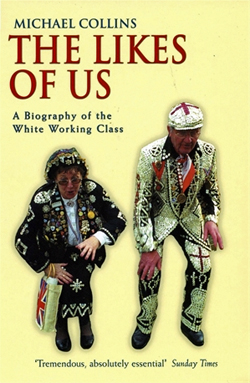
Once they were portrayed as the salt of the earth. Nowadays, they take to the streets when paedophiles and asylum seekers are in their midst; they expose their lives in TV documentaries; they love Gucci and hate the Euro – the broadsheets cast them as xenophobes and exhibitionists and mock their tastes and attitudes. Who are the white working class and what have they done to deserve this portrayal? The Likes of Us is a fascinating and wholly original examination of London’s white working class.
Posted on October 20, 2004 by The Orwell Prize -

The late Hugo Young, The Guardian’s senior political commentator, was honoured with a Special Prize at the Awards Ceremony 2004. He had been shortlisted for the Book Prize for Supping with the Devils: Political Journalism from Thatcher to Blair, but the judges instead presented his family with a Special Prize recognising his outstanding contribution to political journalism.
Other links
Posted on October 19, 2004 by The Orwell Prize -

I became a journalist almost by accident. Having learned Russian and been hired after university by Reuters (to my own surprise and the slight dismay of traditionally-minded editors who weren’t sure a Guardian-reading blonde female would be tough enough for the job), I was then catapulted into the adrenaline-charged realm of conflict reporting. While on a trainee assignment in Paris, I fell in with the Cambodian émigré community and ended up reporting in Cambodia myself, a decade after the Khmer Rouge regime ended, as well as covering Cambodian peace talks in places as far apart as Indonesia and Paris. That led to a conflict reporting job in Africa, commuting between Angola and Mozambique and writing about death, destruction, diamonds and disease, and later to a posting in a country that stopped being the Soviet Union three months after I arrived. I spent much of the early 1990s in smoky taxis in the Caucasus mountains, covering a series of small post-Soviet conflicts that built up to the war in Chechnya. As a journalist I’ve written for, among others, The Times and its website, the Los Angeles Times, Prospect, the Times Literary Supplement, The Guardian Saturday magazine, the Daily Mail, the Evening Standard, Eve magazine, The Observer Food Monthly and The Erotic Review. I’ve written six books: four historical novels and two non-fiction books about my experiences as a journalist.
Other links
Posted on October 19, 2004 by The Orwell Prize -
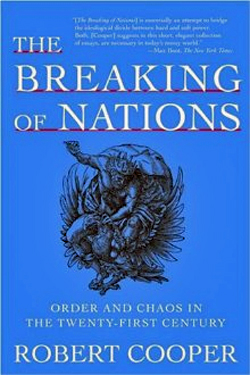
When communism collapsed in 1989 there was a fundamental change in the European state system. This landmark book presents a radical interpretation of the new international order. Many of what Cooper calls ‘post-modern’ states, including the EU and Japan, operate on the basis of openness, law and mutual security. The United States, Cooper shows, has yet to decide whether to embrace the ‘post-modern’ world of independence, or to pursue unilateralism and power politics. The key question is how these states should deal with a world in which terrorists ignore borders and the familiar certainties of the Cold War alliances no longer exist. He argues theat Europeans have to be prepared to use the rougher methods of an earlier era – force, pre-emptive attack, deception – if they are serious about safeguarding the stability they have achieved.
The Breaking of Nations is required reading for those seeking to understand the uncertain times in which we live.
Posted on October 19, 2003 by The Orwell Prize -
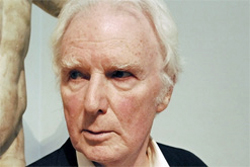
Brian Sewell began his career having graduated from Courtauld Institute, London University. He has worked for The Royal Academy, The British Council, The Arts Council and the Royal Collection at Windsor Castle. He has also written many exhibition catalogues for the Royal Academy and Council of Europe. Since 1984, he has been the Art Critic for the Evening Standard and has won the award for ‘Art Critic of the Year’ on several occasions. For ten years, Brian worked as an Expert in Old Masters for Christie’s. He has advised a number of Museums on purchases and the improvement of collections and has taught in a number of universities. Brian is known as an experienced broadcaster and has contributed to programmes for both radio and television, including various commercials. He has appeared on programmes ranging from Have I Got News for You, The Antique Show, The Great Antiques Hunt, Call My Bluff, The Naked Pilgrim and numerous programmes about art.
Posted on October 19, 2003 by The Orwell Prize -

Francis Wheen has established himself as one of the most brilliant and admired journalists writing in Britain today with his massively acclaimed biography of Karl Marx, his contributions to radio and TV and his outstanding commentary and analysis.
This book brings together the best of his collected journalism from The Guardian, Observer and magazines such as Esquire and The Modern Review. Ranging from the follies of think-tanks to the future of swearing, the hypocrisy of New Labour to the madness of retired prime ministers, all via shady business deals and scabrous gossip, this is a book that none of Wheen’s legion of admirers will want to miss.
Posted on October 19, 2002 by The Orwell Prize -
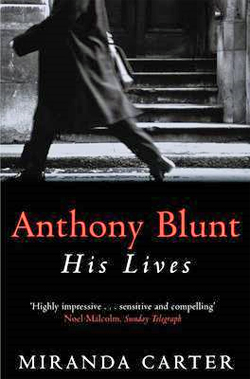
When Anthony Blunt died in 1983, he was a man about whom almost anything could be – and was – said. As Surveyor of the Queen’s Pictures and Director of the Courtauld Institute, Blunt’s position was assured until his exposure in 1979 left his reputation in tatters.
Miranda Carter’s brilliantly insightful biography gives us a vivid portrait of a human paradox. Blunt’s totally discrete lives, with their permanent contradictions, serve to remind us that there is no one key to any human being’s identity: we are all a series of conflicting selves.
- Miranda Carter and Sir David Omand, ‘How intelligent are our intelligence services?’ at the Sunday Times Oxford Literary Festival 2010
Posted on October 19, 2002 by The Orwell Prize -
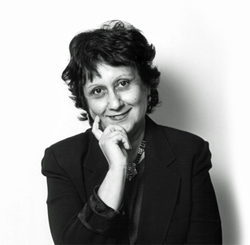
Yasmin Alibhai-Brown came to this country in 1972 from Uganda. She completed her M.Phil. in literature at Oxford in 1975. She is a journalist who has written for The Guardian, Observer, New York Times, Time, Newsweek, Daily Mail and other newspapers and is now a regular columnist on The Independent and London’s Evening Standard. She is also a radio and television broadcaster and author of several books. Her book, No Place Like Home, was an autobiographical account of a twice removed immigrant. From 1996 to 2001 she was a Research Fellow at the Institute for Public Policy Research which published True Colours on the role of government on racial attitudes. Tony Blair launched the book in March 1999. She is a senior fellow at the Foreign Policy Centre. In 2000 she published, Who Do We Think We Are? which went on to be published in the US too, an acclaimed book on the state of the nation. After Multiculturalism, a pamphlet re-assessing the multicultural ideology in Britain was the first critical examination by a social democrat of a settled and now damaging orthodoxy. In 2001 came the publication of Mixed Feelings, a book on mixed race Britons. Her most recent book is The Settler’s Cookbook (2009).
Other links
Posted on October 19, 2001 by The Orwell Prize -

In ‘real’ wars, whole nations are mobilised, soldiers fight and die, victories are won. In virtual war, hostilities may not even be declared; the combatants are strike pilots and computer programmers, the watching nation is a television audience and instead of victory there is just an uncertain endgame. Kosovo was a virtual war: fought by pilots at 15,000 feet, commanded by generals whose only view of the battle was through their pilots’ bombing sights, reported by opposing media with competing versions of the damage; a war in which Americans and NATO forces did the fighting but only Kosovars and Serbs did the dying.
Michael Ignatieff has travelled these battle zones for a decade, sending back moving reports and penetrating analysis. Yet Kosovo in 1999 moved armed aggression into a new phase, and in Virtual War he examines this strange, remote type of warfare through the eyes of the key players – the roving diplomat Richard Holbrooke, General Wesley Clark and Louise Arbour, chief prosecutor of the war crimes tribunal – and of the people who suffered.
Posted on October 19, 2001 by The Orwell Prize -

Won for journalism published by The Independent. David Aaronovitch is a writer, broadcaster and commentator on culture, international affairs, politics and the media. His regular column appears every Thursday in The Times. A former television researcher, producer and programme editor, he has previously written for The Independent, The Guardian and The Observer, winning numerous accolades, including Columnist of the Year 2003. He has appeared on the satirical TV current affairs programme Have I Got News For You, presented a number of radio and television series and programmes on current affairs and historical topics. His first book, and account of a journey by kayak on the rivers and canals of England, Paddling to Jerusalem, was published in 2000 and won the Madoc Prize for travel writing. In 2009 he published Voodoo Histories, a book on the history and attraction of conspiracy theories.
Other links
Posted on October 19, 2000 by The Orwell Prize -

Eighteen-year-old Stephen Lawrence, the son of Jamaican immigrants, was murdered on the night of 22 April 1993 whilst standing at a bus-stop, by a gang of white youths. Cathcart wrote a long piece about the murder and all its ramifications for Granta magazine (59), and this is the basis for his book: an account of the crime, the investigation and the criminal culture of South-East London that gave rise to the murderers.
Posted on October 19, 2000 by The Orwell Prize -

David began his career as a reporter for the East Antrim Times. He joined the Irish Times in 1973 as a reporter in Belfast, becoming Northern editor in 1976 and London editor in 1981. He worked briefly for BBC Northern Ireland, 1985-6, before joining the The Independent (London) in 1986; he has since worked as the paper’s Irish correspondent. Widely recognised for the scope of his knowledge and the balance of his reporting on Northern Ireland, he contributes regularly to overseas newspapers and journals. His many awards include the Christopher Ewart-Biggs Memorial Prize for the promotion of peace and understanding in Northern Ireland, 1989 and 2001; and Correspondent of the Year, 1999.
Other links
Posted on October 19, 1999 by The Orwell Prize -
Robert Fisk, Middle East correspondent of The Independent, is the author of Pity the Nation: Lebanon at War. He holds numerous awards for journalism, including two Amnesty International UK Press Awards and seven British International Journalist of the Year awards. His other books include The Point of No Return: The Strike Which Broke the British in Ulster; In Time of War: Ireland, Ulster and the Price of Neutrality, 1939-45; and The Great War for Civilisation: the Conquest of the Middle East.
Posted on October 19, 1999 by The Orwell Prize -

As D. M. Thomas states in his masterly biography of the Nobel Prize-winning author Alexander Solzhenitsyn, ‘He helped to bring down the greatest tyranny the world has seen, besides educating the West as to its full horror. No other writer in our century has had such an influence on our history.’
The author of The First Circle, Cancer Ward and The Gulag Archipelago can truly be said to have altered Russia and thus the pattern of our times. This is as much a disturbing, haunting history of the twentieth century as it is a biography of a great novelist. Given the extraordinary language of Thomas and his novelistic gifts which he uses to render his story, this work will come to be regarded as one of the great biographies of recent decades. Particularly impressive is the vast cooperation of Solzhenitsyn’s first wife, Natalya, who has provided an astonishing portrait of her ex-husband’s life in Russia before his departure in 1974 from the then Soviet Union. The photographs used for the book come from her own collection as well.
















